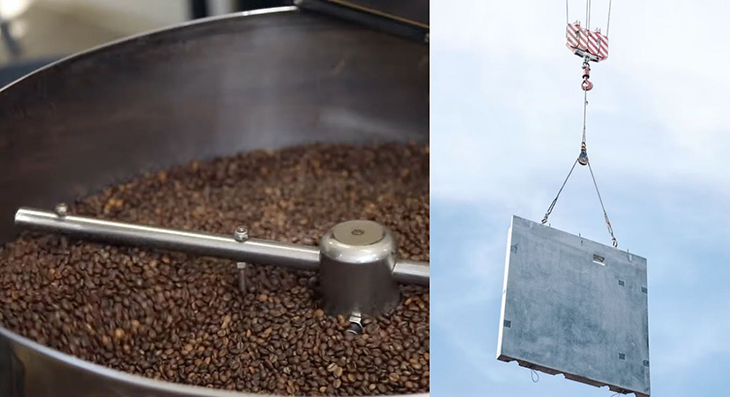
In a remarkable stride towards sustainability, Australian engineers have unveiled a groundbreaking technique that strengthens concrete while reducing coffee waste’s environmental impact.
This innovative approach transforms discarded coffee grounds into a powerful additive for concrete, bolstering its structural integrity and simultaneously the waste that ends up in landfills.
The brainchild of a team at RMIT University, this novel method involves the conversion of waste coffee grounds into biochar through a “low-energy process,” ultimately enhancing concrete’s strength by an impressive 30%.
With a global annual coffee consumption of over 11 million tons, the disposal of coffee waste has become an escalating environmental concern, primarily due to the substantial emission of greenhouse gases, such as carbon dioxide and methane, generated during its decomposition. Methane, in particular, is 21 times more potent than carbon dioxide in its climate-warming effects.
Moreover, the construction industry, a major consumer of concrete, relies on a staggering 50 billion tons of natural sand annually. This relentless mining of a finite resource imposes a considerable ecological burden. The integration of coffee biochar into concrete formulations represents an ingenious solution to this issue, as it can serve as a sustainable substitute for a portion of the finite natural sand resource.
Professor Jie Li, the head of the research team, emphasizes that their study marks a pivotal breakthrough in the realm of construction materials.
Professor Li explains, “The ongoing extraction of natural sand around the world–typically taken from river beds and banks–to meet the rapidly growing demands of the construction industry has a big impact on the environment.”
“With a circular-economy approach, we could keep organic waste out of landfill and also better preserve our natural resources like sand,” he adds.
Dr. Rajeev Roychand, lead author of the research paper published in the Journal of Cleaner Production, said, “The inspiration for our work was to find an innovative way of using the large amounts of coffee waste in construction projects rather than sending it to landfills.”
Dr. Roychand also says that this is the first instance where waste coffee grounds have been harnessed to augment the strength of concrete. This pioneering approach is not only environmentally friendly but also economically advantageous, offering a pragmatic strategy to reduce organic waste and enhance the sustainability of the construction industry.
“They have already engaged us for their upcoming infrastructure projects incorporating pyrolysed forms of different organic wastes.”
The core of this innovative process lies in the conversion of coffee grounds into biochar through a method known as pyrolysis. In this process, organic waste is subjected to high-temperature heating in the absence of oxygen, typically at around 350 degrees Celsius. The result is a porous and carbon-rich material, biochar, which is well-suited for use in various applications, including improving the properties of concrete.
Co-researcher, Dr. Mohammad Saberian, who is working with his team next on field trials said,
“Our research team has gained extensive experience in developing highly optimized biochars from different organic wastes, including wood biochar, food-waste biochar, agricultural waste biochar, and municipal solid-waste biochar, for concrete applications.”
These exciting findings are poised to revolutionize organic waste management and reduce the environmental footprint associated with coffee consumption. The innovative use of coffee biochar as a concrete enhancer is a testament to the potential of sustainable practices in the construction industry.
By converting what was once waste into a valuable resource, this breakthrough contributes to the broader global mission of ensuring sustainability and minimizing the adverse effects of waste generation.
Beyond the environmental benefits, this groundbreaking approach also has the potential to pique the interest of local governments grappling with the disposal of organic waste. The technique developed by the RMIT University team not only provides a novel solution for coffee grounds but also offers a blueprint for managing other organic waste streams more sustainability, potentially reducing landfill volumes and their association with environmental impacts.
See more about this amazing process in the video below:
What are your thoughts? Please comment below and share this news!
True Activist / Report a typo


